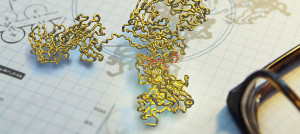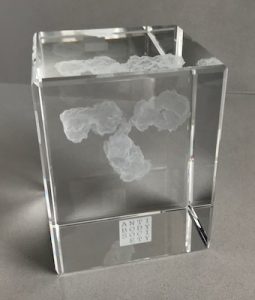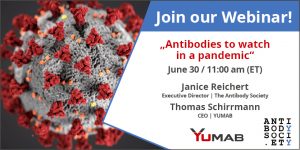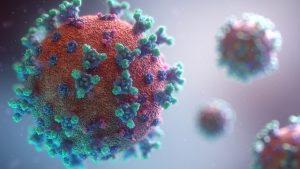 Author: Nick Hutchinson, Mammalian Cell Culture, Business Steering Group Lead, FUJIFILM Diosynth Biotechnologies (nick.hutchinson@fujifilm.com)
Author: Nick Hutchinson, Mammalian Cell Culture, Business Steering Group Lead, FUJIFILM Diosynth Biotechnologies (nick.hutchinson@fujifilm.com)
The COVID-19 crisis has had a devastating impact on populations across the world and caused the death of hundreds of thousands of people. The Antibody Society spoke to Dr. Jacob Glanville, CEO and President of Distributed Bio, Inc. to learn how his company has approached the development of new antibody therapeutics against the SARS-CoV-2 Coronavirus. He described how the crisis has stimulated innovation that may revolutionize the way we approach antibody discovery and development once the current pandemic is under control.
Dr Glanville explained, “The problem, when we think of every major outbreak, such as Ebola, SARS, MERS, Swine Flu, Avian Flu, is that the time it takes to develop a new drug is too long compared to the speed with which we need it. De novo discovery is too slow.”
To develop antibody therapeutics against COVID-19 as quickly as possible, Distributed Bio identified anti-SARS antibodies from almost 20 years ago that researchers had already shown would neutralize the SARS virus in vitro, protect mice from lethal challenge, and had known crystal structures. These antibodies have been studied extensively but were eventually too late to have an impact on the SARS crisis of 2003. It was Glanville’s idea to take advantage of the detailed functional research already performed on these antibodies and, try to retrofit them to bind to the new version of their original target the virus SARS-CoV-2. For this purpose, Distributed Bio applied their Tumbler technology, a computationally-guided antibody optimization method, capable of producing a library of billions of variants of individual antibodies exploring variations of all six complementarity-determining regions simultaneously.
“The novel coronavirus has around 74% homology in identity with the SARS receptor binding domain. I knew exactly how similar they were to the novel coronavirus as we had crystal structures of the SARS epitope. I believed that if we took five anti-SARS antibodies, there was going to be a pretty good chance that we would be able to adapt them to be a potent medicine against COVID-19,” said Glanville. “We already knew that they had the correct function, that they bound the right epitope in the right orientation with the right elbow angles. I believed that we could optimize them and enhance their affinity by making billions of versions of the antibodies within the library,” he continued.
According to Glanville, this is crucially important because historically, with outbreaks such as Ebola, the first antibodies launched were essentially prototypes with low potency or had inferior characteristics such as poor thermostability. It was the best-in-class not the first antibody that was successful, ultimately.
Distributed Bio were able to adapt all five antibodies in just nine weeks, a testament to the remarkable speed of these novel technologies. They sent a set of the most promising candidates to five laboratories which independently confirmed their ability to bind to the new SARS-CoV-2. The company then selected the two most potent antibodies for in-vivo testing, and two laboratories confirmed independently that both candidates protected healthy, as well as immuno-compromised animals using hamster models.





